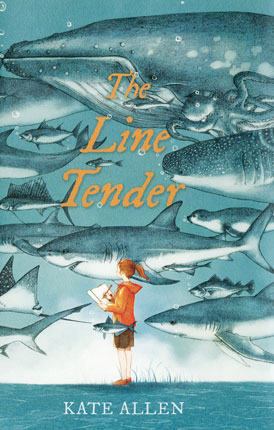| Line tender Author: Allen, Kate | ||
| Price: $6.50 | ||
Summary:
Following a tragedy that further alters the course of her life, twelve-year-old Lucy Everhart decides to continue the shark research her marine biologist mother left unfinished when she died years earlier.![]() Download a Teacher's Guide
Download a Teacher's Guide
| Accelerated Reader Information: Interest Level: MG Reading Level: 4.60 Points: 9.0 Quiz: 501508 | Reading Counts Information: Interest Level: 6-8 Reading Level: 4.40 Points: 16.0 Quiz: 76799 | |
Reviews:
Kirkus Reviews (+) (01/15/19)
School Library Journal (00/03/19)
Booklist (04/01/19)
The Bulletin of the Center for Children's Books (+) (00/04/19)
The Hornbook (00/03/19)
Full Text Reviews:
School Library Journal - 03/01/2019 Gr 5–8—Twelve-year-old Lucy Everhart is growing up in the 90s in Rockport, MA, five years after her mother, a marine-biologist and shark specialist, passed away. As a summer assignment, she creates a field guide with her best friend, Fred, who is as much of a science enthusiast as Lucy's mother was. Her relationship with Fred becomes more complicated as the two begin developing feelings for one another—then Fred suddenly dies in an accident. Lucy copes with his death by delving into her mother's unfinished research with the help of her father, a local fisherman, and an elderly neighbor. The four form a bond which helps them all to overcome their own personal struggles. Lucy is a grounded, relatable character and the way she processes her grief is believable. Allen skillfully tackles the difficult issues without becoming too didactic or morose. The inclusion of women scientists, including Lucy's mother and, later, one of Lucy's mother's colleagues, is welcome as is Lucy's own budding interest in marine biology. A two-page black-and-white sketch of a different shark accompanies each chapter, reflecting Lucy's own affinity for art. VERDICT Thoughtful and moving, this coming-of-age middle grade novel is a worthwhile addition to any collection serving middle school students.—Laura J. Giunta, Garden City Public Library, NY - Copyright 2019 Publishers Weekly, Library Journal and/or School Library Journal used with permission.
Booklist - 04/01/2019 *Starred Review* Novels dealing in loss and grief often result in potent stories, not because they’re “serious” or “sad,” but because—if done right—they dig into a character’s complexities. Death alters characters’ landscapes in unfathomable ways, plunging them into uncertain waters and challenging them, first to stay afloat, and then to swim with new purpose. At the start of Allen’s probing debut, Lucy and her father have carved out an imperfect but happy life together after the death of Lucy’s mother, Helen, five years earlier. Lucy spends most of her time with her best friend and neighbor, Fred, and their summer has been largely devoted to a school project: creating a field guide to Cape Ann, their coastal New England town. Together, they make up the perfect team: science-minded Fred supplies the guide’s facts and data, and Lucy uses her artistic talents to illustrate each specimen.When Sookie, a family friend and fisherman, catches a great white, the two kids race to the harbor to get a close look at the shark in order to add it to their guide. Its presence stirs up reporters, as well as Lucy’s interest in her mom’s work, which was devoted to studying sharks. An unpublished proposal by Helen to study great-white populations in New England captures Fred and Lucy’s attention and takes on a greater significance for Lucy after a tragic swimming accident claims Fred’s life. In her efforts to cope, Lucy begins writing Fred postcards since they can no longer talk. She also immerses herself in understanding Helen’s proposal and perfecting her shark drawings, wanting to figure out what had utterly captivated her mom and Fred about the great whites—the spike in sightings that summer only spurring her on. Because, to Lucy, making sense of this thing will mean making sense of her world and two people she loves who are no longer in it.While Allen packs a lot into this story, it never feels overstuffed. Its pieces have purpose, and just as many speak to the average tween experience—getting your period, the confusion of first crushes—as they do to navigating grief and the panic absence can bring. The latter two points put an interesting number of responses on display outside of Lucy’s experiences, underscoring how the deaths of Helen and Fred impact many characters, including Lucy’s dad, who she comes to understand is still struggling with both. Lucy’s efforts to get to the bottom of the study inadvertently help several others reconnect with important parts of their lives and take steps toward healing. Likewise, something in Lucy clicks when her teacher looks at hers and Fred’s field guide and observes, “But artists and scientists aren’t really that different, you know. They both want to figure out how things work.” This idea helps Lucy trace lines between herself and those she lost, like the observant line tender on a search-and-rescue team, and see the parts of them in herself.At times Lucy has more perspective than is believable in a 12-year-old, but this helps keep grief from utterly overwhelming the plot and its characters. Lucy not only gets the chance to get mad and upset and confused about things in her life; she expresses these feelings to others, including her father and a school counselor—something that is still not seen regularly in middle-grade novels. Perhaps there is an idealistic element to these scenes, but there is far more truth to them, and when taken together they will reassure readers that such bewildering emotions are okay and conquerable. Lucy’s shark sketches swim throughout the book, just as they do in her field guide and her mind, and it’s only when she internalizes her mother’s reminder that, as frightening as sharks can be, their threat is diminished when they’re treated with respect, that Lucy begins to tame the fearful elements in her life and find sure footing once more. - Copyright 2019 Booklist.



